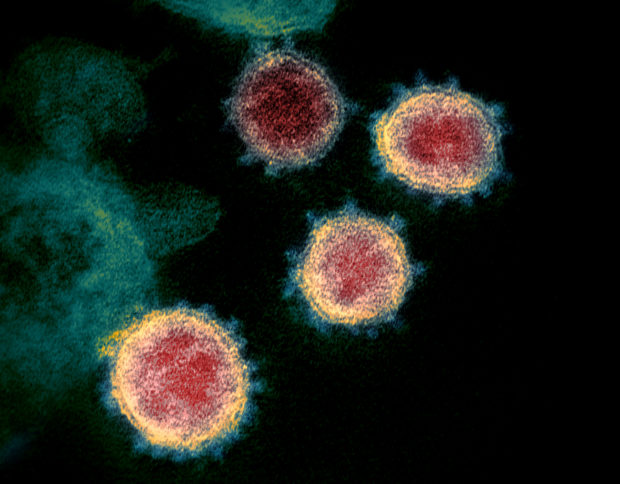DOH detects additional 563 cases of Alpha and Beta variants of COVID-19

FILE PHOTO: This undated transmission electron microscope image shows SARS-CoV-2, also known as novel coronavirus, the virus that causes COVID-19, isolated from a patient in the U.S. NIAID-RML/Handout via REUTERS.
MANILA, Philippines — The Department of Health (DOH) reported on Friday 264 additional cases of the more transmissible COVID-19 Alpha variant first discovered in the United Kingdom and 299 cases of the Beta variant from South Africa, citing results of the latest genome sequencing run.
But the health department noted that only 20 cases of the Alpha variant and 21 cases of the Beta variant remain active.
Dr. Alethea De Guzman, OIC-Director of the DOH Epidemiology Bureau, said in an online media briefing that the latest genome sequencing run processed a total of 679 samples.
She said that a total of 8,557 samples have so far been sequenced in the country, of which 7,216 have been assigned with lineages.
The detection of fresh cases of these coronavirus variants of concern (VOC) in the country was on top of the 16 new cases of the highly contagious COVID-19 Delta variant that was first reported in India.
Article continues after this advertisementDe Guzman reiterated that the Beta variant, or the B.1.351, is the most common lineage among sequenced samples nationwide. She said the COVID-19 Beta variant is 23.4 percent or 1,685 of all the samples with lineages.
Article continues after this advertisementNext to Beta is the Alpha variant that is 20.5 percent or 1,481 cases of all samples with lineages.
The government said that so far, the Delta or B.1.617.2 variant has 35 total cases in the country. It added that the Philippines also has two cases of the COVID-19 Gamma or P.1 variant, which was first detected in Brazil.
De Guzman explained that more VOC cases are being detected in recent genome sequencing runs because the selection of samples is very targeted.
“This is a cumulative percentage. If you will notice, the sequencing we are doing in the most recent runs are very targeted, meaning pinaprioritize natin ang mga nanggagaling sa ibang bansa, ‘yung incoming international travelers at ‘yung mga areas kung saan tayo nagkakaroon ng spike,” she explained.
(This is a cumulative percentage. If you will notice, the sequencing we are doing in the most recent runs is very targeted, meaning we prioritize incoming international travelers and areas where we are seeing a spike in cases.)
“Kaya nakikita natin na bawat run natin noong mga nakaraang linggo, malaking porsyento talaga ng mga nakikita natin ay mga VOC na,” she added.
(This is why we are seeing a high percentage of VOC cases in the last weeks in our genome sequencing.)
Meanwhile, Health Undersecretary Maria Rosario Vergeire assured that the DOH is in close coordination with the Centers for Health Development and concerned local government units to ensure that all variant cases, especially those of Delta, have been properly managed. She added that the Bureau of Quarantine and the Department of Transportation are on high alert to implement strict border control measures.
Vergeire said the government has “delayed” the entry of the Delta variant with the activation of Doors 1 and 2 in the DOH strategy, which refers to imposing travel restrictions and providing safeguards in easing travel restrictions due to economic impacts.
“Now that the country has detected local cases of the Delta variant, Doors 3 and 4 are being activated. Door 3 would involve strengthening the implementation of the PDITR (Prevent-Detect-Isolate-Treat-Reintegrate) strategies while Door 4 is ensuring that our healthcare capacity is ready for a possible surge,” she added.
KGA
For more news about the novel coronavirus click here.
What you need to know about Coronavirus.
For more information on COVID-19, call the DOH Hotline: (02) 86517800 local 1149/1150.
The Inquirer Foundation supports our healthcare frontliners and is still accepting cash donations to be deposited at Banco de Oro (BDO) current account #007960018860 or donate through PayMaya using this link.